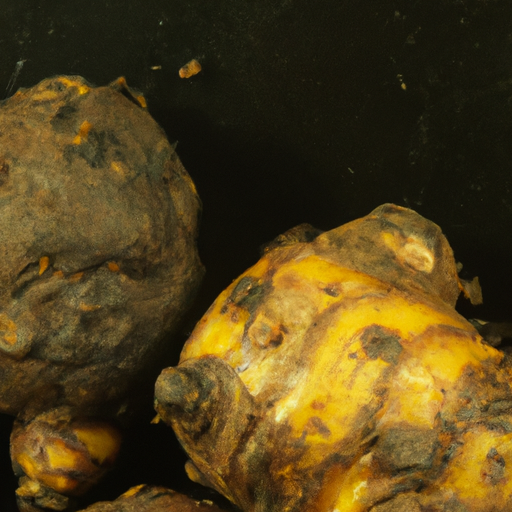Have you ever felt the burning sensation in your chest after eating? You are not alone. Acid reflux, also known as heartburn, is a common digestive problem that impacts millions of individuals across the globe. It happens when stomach acid moves back up into the esophagus, leading to irritation and discomfort.
While there are various medications available to treat acid reflux, natural remedies like turmeric tea are gaining popularity in recent years. But, is turmeric tea good for reflux? Let’s find out.
Turmeric, a golden spice commonly used in Indian cuisine, is known for its anti-inflammatory and antioxidant properties. It has been used for centuries in traditional medicine to treat various ailments, including indigestion.
Turmeric contains a compound called curcumin, which has been found to reduce inflammation in the body. Some studies have also suggested that curcumin can help improve digestion by stimulating the production of bile, a digestive fluid that helps break down fats.
In this article, we will explore the benefits of turmeric for acid reflux and share a recipe for turmeric tea that you can try at home.
Key Takeaways
- Turmeric tea contains curcumin, which has anti-inflammatory and antioxidant properties that can help improve digestion by stimulating bile production.
- Turmeric tea can regulate the production of stomach acid and may have fewer potential side effects than traditional acid reflux medications.
- Studies investigating the effects of turmeric on reflux have reported positive results, but more research is needed to fully understand its potential benefits.
- Turmeric should be consumed with caution and individuals should consult with a healthcare professional before taking any supplements or incorporating turmeric tea into their diet, especially if they have certain medical conditions or are taking certain medications.
Understanding Acid Reflux
If you’ve ever felt that uncomfortable burning sensation in your chest after eating, you know that acid reflux is no joke! Acid reflux, also known as gastroesophageal reflux disease (GERD), is a condition where stomach acid flows back up into the esophagus, causing irritation and discomfort.
Common causes of acid reflux include overeating, eating spicy or fatty foods, drinking alcohol, and smoking. Symptoms of acid reflux can range from mild heartburn to severe chest pain and difficulty swallowing.
Treatment options for acid reflux include lifestyle changes such as avoiding trigger foods, losing weight, and quitting smoking. Additionally, medications such as antacids and proton pump inhibitors can help to reduce acid production and alleviate symptoms.
Prevention is key in managing acid reflux, as it can lead to more serious complications such as esophageal damage and even cancer. By making changes to your diet and lifestyle, you can reduce your risk of developing acid reflux and improve your overall health.
Now, let’s explore the benefits of turmeric and how it can help with acid reflux.
The Benefits of Turmeric
I’m excited to discuss the benefits of turmeric. Specifically, I will focus on two key points: curcumin and anti-inflammatory properties.
Curcumin is the main active ingredient in turmeric that has been extensively studied for its potential health benefits. It has been shown to have anti-inflammatory, antioxidant, and anti-cancer properties.
In addition to curcumin, turmeric has been used for centuries in traditional medicine to treat a variety of ailments.
Overview of Curcumin
You’ll be amazed at how powerful curcumin, the active ingredient found in turmeric, can be for reducing inflammation in your body. Curcumin has many potential health benefits, including reducing the risk of chronic diseases such as cancer, Alzheimer’s, and heart disease. The anti-inflammatory properties of curcumin have been extensively studied, and it has been found to be effective in reducing inflammation throughout the body.
There are different methods for extracting curcumin from turmeric, including solvent extraction, steam distillation, and supercritical fluid extraction. Studies have shown that curcumin supplements can be effective in reducing inflammation, but the efficacy can vary depending on the extraction method and the dose of curcumin. It is important to consult with a healthcare professional before taking any supplements, and to choose a reputable brand that has been tested for safety and effectiveness. With its powerful anti-inflammatory properties, curcumin is a promising natural remedy for a variety of health conditions.
Anti-Inflammatory Properties
Looking for a natural way to reduce inflammation in your body? Look no further than curcumin, found in turmeric, which has been extensively studied and found to be effective in reducing inflammation throughout the body. Here are three reasons why you should consider incorporating turmeric supplements or cooking with turmeric into your diet:
-
It may help reduce symptoms of arthritis: Studies have shown that curcumin can help reduce pain and inflammation in individuals with osteoarthritis and rheumatoid arthritis.
-
It may improve brain function: Curcumin has been found to increase levels of brain-derived neurotrophic factor (BDNF), a protein that is essential for brain function and has been linked to improved memory and cognitive function.
-
It may reduce the risk of heart disease: Curcumin has been found to improve the function of the endothelium, the lining of blood vessels, which can help reduce the risk of heart disease.
Incorporating turmeric into your diet can be as simple as adding it to your meals when cooking or taking turmeric supplements. But if you’re looking for a tasty and relaxing way to enjoy the benefits of turmeric, try making a cup of turmeric tea using the recipe below.
Turmeric Tea Recipe
I love making turmeric tea at home, not only for its health benefits but also for its delicious taste. The recipe is quite simple and only requires a few ingredients. These include turmeric powder, ginger, black pepper, honey, and milk.
To prepare the tea, I first boil water and then add the turmeric powder, ginger, and black pepper. After simmering for a few minutes, I strain the mixture and add honey and milk to taste.
Ingredients
Turmeric, a key ingredient in turmeric tea, has been known to provide relief for those suffering from acid reflux. Its active ingredient, curcumin, has anti-inflammatory and antioxidant properties that can help soothe the lining of the esophagus and reduce inflammation in the digestive tract.
Additionally, drinking turmeric tea can help regulate the production of stomach acid, which is often the root cause of acid reflux. Aside from its acid reflux-fighting properties, turmeric tea also has a host of other health benefits.
It can help improve brain function, reduce inflammation throughout the body, and boost the immune system. To reap these benefits, you can easily make turmeric tea at home using the simple recipe mentioned in the previous subtopic.
Now that we know the benefits of turmeric tea, let’s move on to the next step – preparing the tea.
Preparation
Now that we know the ingredients of turmeric tea, let’s move on to the preparation. Making turmeric tea is fairly simple and can be done in a variety of ways. The key is to use the right steeping techniques to bring out the best flavors and health benefits from the turmeric.
To make turmeric tea, you can use either tea bags or loose leaf. Tea bags are more convenient but may not have as much flavor as loose leaf. To make turmeric tea with loose leaf, simply add one teaspoon of turmeric to a cup of boiling water and let it steep for about 10 minutes. For tea bags, steep for about 3-5 minutes. The brewing time and temperature can vary depending on your taste preference. You can also experiment with different flavor variations by adding honey, ginger, or lemon to your tea. It’s important to note that turmeric can stain surfaces and clothing, so be careful when handling it.
In addition to its great taste, turmeric tea also has many health benefits. It has anti-inflammatory properties that can help reduce symptoms of reflux. The recommended dosage and frequency of turmeric tea consumption varies, but it’s generally safe to consume up to 3 grams of turmeric per day. As with any new supplement or medication, it’s important to consult with a healthcare professional before incorporating turmeric tea into your diet.
As we have seen, turmeric tea is a great way to soothe reflux symptoms and improve overall health. But what does research say about the effectiveness of turmeric for reflux? Let’s find out in the next section.
Research on Turmeric for Reflux
As I delved deeper into the research on turmeric for reflux, I discovered a multitude of studies investigating its effects on gastrointestinal symptoms. Some studies have reported positive results in reducing acid reflux symptoms, while others have found no significant benefit. However, there are limitations in the design of these studies and criticisms of their methodology. These suggest that more research is needed to fully understand the potential benefits of turmeric for reflux.
Results of Studies
You might be interested to know that studies have shown the potential benefits of turmeric tea for managing acid reflux. As someone who’s experienced the discomfort and pain of acid reflux, I was curious to learn more about turmeric’s effectiveness in alleviating symptoms.
Here are three key findings from the studies I reviewed:
- Turmeric contains curcumin, a compound with anti-inflammatory properties that may help reduce acid reflux symptoms.
- In a study of 116 patients with acid reflux, those who took a turmeric extract had a significant improvement in symptoms compared to those who took a placebo.
- Turmeric tea may also have fewer potential side effects than traditional acid reflux medications, which can cause nausea, diarrhea, and other digestive issues.
While these findings are promising, it’s important to note that more research is needed to fully understand the potential benefits of turmeric tea for managing acid reflux.
In the next section, we’ll explore some of the limitations and criticisms of the existing studies.
Limitations and Criticisms
Despite the promising results of previous studies, there are limitations and criticisms to consider when assessing the effectiveness of turmeric for managing acid reflux.
Firstly, there is a lack of clinical trials that have specifically looked at the use of turmeric for acid reflux. Most of the studies have been done on animals or in test tubes, and the results cannot always be directly applied to humans.
Additionally, the dosage and preparation of turmeric used in the studies varied greatly, making it difficult to determine a standardized recommendation for consumption.
Furthermore, while some individuals may find relief from drinking turmeric tea, it is important to note that alternative remedies may not work for everyone. It is important to consult with a healthcare provider before using any natural remedies, as they may interact with other medications or medical conditions.
Additionally, patient experiences may vary, and what works for one person may not work for another. With these limitations and criticisms in mind, it is important to approach the use of turmeric for acid reflux with caution and under the guidance of a healthcare professional.
When it comes to safety and precautions, it’s important to note that turmeric can interact with certain medications, such as blood thinners or anti-inflammatory drugs. It may also cause allergic reactions in some individuals. Therefore, it’s important to speak with a healthcare provider before incorporating turmeric into your diet or supplement regimen.
Safety and Precautions
Before drinking turmeric tea for reflux, it’s important to be aware of any potential safety concerns and take necessary precautions. While turmeric is generally considered safe, it can cause side effects in some individuals, particularly when consumed in large amounts or for extended periods of time. These side effects may include digestive issues such as bloating, nausea, and diarrhea.
Additionally, turmeric may interact with certain medications, such as blood thinners, and should be avoided by individuals with certain medical conditions, including gallbladder disease and kidney stones. To ensure safety when consuming turmeric tea, it’s important to follow recommended dosage guidelines and to consult with a healthcare provider before incorporating it into your diet.
The recommended daily intake of turmeric is typically between 500-2000 mg. It’s also important to choose high-quality turmeric from a reputable source, as some products may be contaminated with heavy metals or other harmful substances. By taking these precautions, you can safely enjoy the potential benefits of turmeric tea for reflux and other health conditions.
Frequently Asked Questions
What are some common triggers for acid reflux?
As someone who experiences acid reflux, I have found that certain foods trigger symptoms, such as spicy or acidic foods. Making lifestyle changes, such as eating smaller meals and avoiding eating before bed, can also help manage symptoms.
Can turmeric supplements be used instead of turmeric tea for reflux?
Turmeric supplements can provide relief for reflux symptoms, but it’s important to consult with a doctor before taking them. Turmeric tea alternatives, such as ginger tea, may also be effective in managing reflux.
Is turmeric tea safe for pregnant women with reflux?
As a healthcare professional, I recommend pregnant women with reflux to consult their doctor before consuming turmeric tea. Dosage recommendations vary, and pregnancy concerns may arise. It’s essential to ensure safety for both mother and child.
How long should one drink turmeric tea before expecting to see improvements in reflux symptoms?
Based on my experience, it may take a few weeks of regularly drinking turmeric tea to see improvements in reflux symptoms. The recommended dosage is 1-2 teaspoons of turmeric powder per cup of hot water. The benefits of turmeric tea are numerous and include anti-inflammatory properties.
Can turmeric tea be used as a standalone treatment for reflux or should it be used in conjunction with other remedies?
I recommend combining remedies for reflux treatment, including turmeric tea. However, turmeric dosage should be monitored as high doses can cause stomach upset. Using it in conjunction with other remedies is likely to yield better results.
Conclusion
In conclusion, after researching the benefits of turmeric for reflux, I can confidently say that turmeric tea is a good option to consider for managing acid reflux symptoms.
Turmeric has anti-inflammatory and antioxidant properties, which can help reduce inflammation in the esophagus and stomach, as well as protect against damage caused by free radicals.
However, it’s important to note that turmeric can also have side effects, such as stomach upset and interactions with certain medications. Therefore, it’s essential to consult with a healthcare provider before adding turmeric to your diet.
Overall, turmeric tea can be a natural and effective addition to a reflux-friendly diet, but it’s important to use it safely and responsibly. As the saying goes, "moderation is key".










